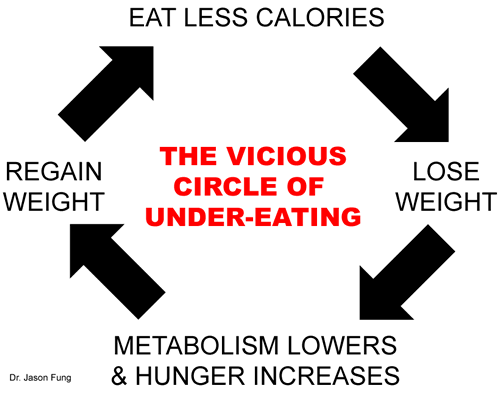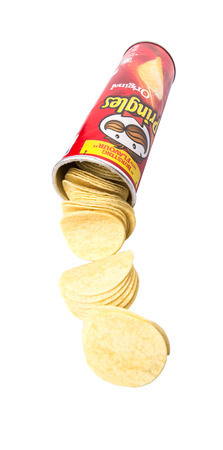Calorie restricted diets don't work
Most people try to lose weight with a combination of restricting calories and doing a little more exercise. Particularly restricting calories from fat. Over the last 40 years the weight loss food industry has boomed. So has the opportunity to do exercise via gyms and health clubs. So why hasn't the "Eat less & move more" model worked? Why have the western nations seen obesity rates rise year on year? The UK GP's database between 2004 and 2014 showed the success rates of eating less and doing more exercise covering millions of patients. Here were the results:
- The probability of an obese person achieving normal weight and keeping there: 0.6%
- The probability of a morbidly obese person achieving normal weight and keeping there: 0.1%
- 80% of people who lose 10% of their weight put it back on within a year.
However the medical and fitness industry has predominantly pushed the idea that reducing calories, lowering fat intake and doing more exercise is the only way to lose weight.

Why does just about every diet fail?
- Calorie restricting diets will slow your metabolism. You will feel cold and lack energy. Heart volume will shrink and heart rate will decrease. THIS IS THE KEY PROBLEM WITH STANDARD DIETS. Research dating back 100 years has shown that baseline metabolic rates can plummet when someone starts a calorie controlled diet. There are documented examples where the metabolism of people burning 3500 calories a day baseline dropped to half that after a period of calorie restriction. YOUR BODIES SURVIVAL MECHANISMS ARE INCREDIBLE!
- In the "Calories in - calories out" mode, calories out can vary wildly. It can go up to 3000 calories/day in some people and down to 1200 calories/day in others. It can also change depending on what we eat and when we eat.
- Calorie restricting diets play havoc with your hormonal health. Testosterone levels fall in men. Women can suffer reduced fertility and weaker bones. Calories don’t control metabolism, hormones do. Calories don’t determine what type of weight you will lose, hormones do. Calories have little influence over hunger, cravings, energy and mood, hormones do.
- Calorie restricting diets can cause nutrient deficiencies which can lead to major health problems.
- Calorie restricting diets tend to reduce muscle mass.
- Calorie restricting diets can reduce your immunity to disease.
- Some diets are hard to stick to. The keto diet is now all the rage, this involves eating 5-10% carbs and 60%+ fat. It gets some amazing results but the gains can quickly unravel if you cheat and return to carbs (eg a holiday, a cruise, Christmas etc).

Think of it as your body going into a semi-starvation mode. Your body is happy being at the weight it is and it will fight against measures to change this. Your body likes to have reserves of energy (fat) and will change your metabolic rate accordingly to counteract any reductions. So if you finally end the period of lower calories, your body will soon add the weight back on thanks to its base calorie requirement being lower. This can lead to "yo-yo dieting".
Typically: You lose the fat and you gain it back!
A big fat lie! The war against fatty foods
There was a famous (yet flawed) 1953 analysis of heart disease called the 7 countries study. The study was done by Ancel Keys who initially looked 22 countries, but only reported on seven: Finland, Greece, Italy, Japan, The Netherlands, United States, and Yugoslavia. Simply looking only at the 7 countries, anyone with would of concluded that there was a clear correlation between the amount of fat you eat and the incidence of heart failure. So began the war on fat, which still rages even to this day. In the coming decades, the following trends occurred:
- Red meat consumption fell drastically.
- Lard was removed from most diets.
- Full fat creams and dairy were switched to lower fat versions.
- Processed oil use (particularly corn) rocketed.
- Clean meats such a chicken became number one.
- Low fat foods were promoted.
- High fructose corn syrup (HFCS) was used widely.
- Sugar consumption rocketed.
- The use of convenience foods and snacks soared.
- Most food companies were bought and international conglomerates were born.

The 7 countries study omitted the data from a further 15 countries. In 1957 there was a second study that was highly critical of Key's conclusions. The data from 22 countries showed that there was a huge variation in the rates of mortality compared to fat intake. The graph on the right clearly shows that many other factors come into play and that there are many countries with high fat intakes that have low incidences of heart mortality rates.
But the damage was already done and the worldwide food industry was well underway with the low-fat mantra.

Switzerland is in interesting example. The Swiss eat loads of fat, cheese and dairy, meat and potatoes. They also love to drink and smoke (nearly 30% of the nation smoke). Yet the Swiss have the 2nd highest life expectancy in the world (Japan is number 1). The Swiss have very strict milk, cheese and meat quality laws. They also love fermented foods which are amazing for gut health. They tend not to snack, relying instead on big wholesome meals. Animal welfare and soil quality is probably the best in the world. As a result the Swiss people eat quality nutrient dense foods (rich in key vitamins such as K2).
So how do you lose weight and keep it off?
- Don't count calories.
- Get your insulin under control! You cannot burn fat if your body is spiking insulin all day long. When insulin is high it tells your cells to take in glucose and puts your body into fat storage mode.
- Undertake fasting and intermittent fasting. Have a set window when you eat so that you are not eating all day long (avoid spiking insulin constantly) - a typical plan is to eat and drink in an 8 hour window. If you have constantly high insulin levels, triggered by constant eating throughout the day, it will be impossible to burn fat. Intermittent fasting is so easy to do, just skip breakfast and try and push lunch out as much as possible.
- Do some daily cardio exercises that you can stick to every day. Make it short and as intensive as possible (HIIT, or high intensity interval training is perfect).
- Get a good nights sleep.
- Focus on foods that will improve your hormonal health.
- Eat nutrient dense foods, especially good fats.
- Eat foods that are wholesome and will fill you up (Satiety is the feeling of having enough).
- Avoid hidden sugars in food and drinks, especially HFCS.
- Avoid processed foods. Use the switching technique, by changing the ingredients and the foods you eat for healthier alternatives. Also, be selective in restaurant meal choice.
- Avoid over-eating. Try and have some portion control, avoid buffets, avoid carvery style places (quality over quantity)
- Avoid hovering (eating the food of children or friends who can't eat everything.)
- Avoid additives (processed food and restaurant food)
- Focus on the essential electrolytes as your body is an electro-chemical system. Get plenty of Himalayan rock salt, magnesium, potassium, calcium, phosphorous and zinc.
- Cook at home.
-
Eat slowly (don't rush, chew, no distractions). Chewing makes digestion further down the line more efficient. The enzymes and bacteria in your saliva start to break down the food. Saliva contains several important enzymes such as amylase, lysozyme and lingual lipase. Lipase is an enzyme that breaks down dietary fats into smaller molecules called fatty acids and glycerol. So for people with a fat digestion issue such as gallbladder problems, chewing is very important.
-
Join a local food group. Source natural and local ingredients. Find good places to eat.
- Take a close look at your alcohol and drink consumption. Many people consume a high proportion of their daily calorific intake from drinks and alcohol (beers, wines, coffee, smoothies, sodas etc). Use the switching technique (switching from calorie laden drinks such as Jack coke, heavy beers, sugary drinks, iced tea, frappes, etc to much better alternatives).
- Keep hydrated. If you don't drink enough your body will start to retain water and bloat. When you don't get enough water, your body panics and holds on to it selfishly, as though you're in a desert. Think of a camels hump as your belly! See our hydration tips.
- Do several small things daily in terms of increasing activity (and make this a habit).
- Try and walk more.
- Use the stairs.
- Do some chores such as house work and gardening.
- Play with the kids or grandchildren.
- Hear Jordan Peterson talk about fixing the small things in life.
- Have an full annual health check up. Men should specifically check their testosterone and estradiol levels.
- Look at your habits. Develop good habits and identify avoid bad ones (habit analysis)
- Focus on your gut health and your gut microbiome.
- Reduce and control stress. Control cortisol, avoid stressful people or situations,. Reduce mobile use (also TV, computers and gaming). Get a massage, take breaks, avoid bad routines. People in life that hold you back and moan all the time are called "boat anchors", get rid of them!
- Stretch (become more supple).
- Use breathing techniques, such as nose breathing and the Wim Hof method.
- Do monthly fitness benchmark testing. Monitor your strength and fitness.
- Review medications and target their removal (following medical advice).
- Stop recreational drugs use.
- Quit smoking or vaping.
- Quit diet drinks. They contain dangerous artificial sweeteners such as aspartame which badly affect gut health.
Calories and Exercise
There are 180 calories in a pack of Starburst. A big bar of Snickers will set you back 280 calories. A large tube of Pringles contains over 800 calories. So it is very easy to consume 500 calories within a few minutes. How much exercise would you need to perform to work off 500 calories?
- 5 miles walking.
- 40 minutes of HIIT exercise.
- An hour of breaststroke swimming.
- 45 minutes of brisk cycling.
- 2 hours of lifting weights.
So as you can see, it's very difficult to out-train a bad diet. You must eat clean nutritious foods and stay away from processed high-sugar foods.

